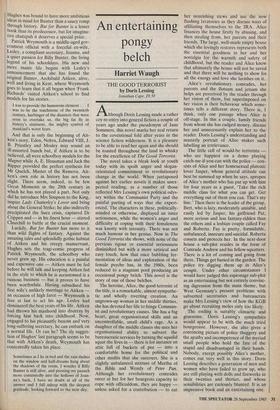An entertaining pongy belch
Harriet Waugh
THE GOOD TERRORIST by Doris Lessing
Jonathan Cape, f9.50
Although Doris Lessing made a rather coy re-entry into general fiction a couple of years ago under the pseudonym of Jane Sommers, this novel marks her real return to the coventional fold after years in the science fiction wilderness. It is a pleasure to be able to read her again and she should be toasted throughout the land in whisky for the excellence of The Good Terrorist.
The novel takes a bleak look at youth today with its spoilt anger and slogan- orientated commitment to revolutionary change in the world. When juxtaposed against her earlier novels it makes unex- pected reading, as a number of those reflected Mrs Lessing's own political odys- sey within the Communist Party and the painful parting of ways that she experi- enced. The characters in these, politically- minded or otherwise, displayed an inner seriousness, while the women's anger and difficulty at coping with their femaleness was knotty with intensity. There was not much humour in her genius. Now in The Good Terrorist she shows, with none of the previous rigour or essential seriousness diminished but with a more satirical and easy touch, how that once bubbling fer- mentation of ideas and exploration of the female psyche has, in the 1980s, been reduced to a stagnant pool producing an occasional pongy belch. This novel is the story of one of those belches.
The heroine, Alice, the good terrorist of the title, is a remarkable, almost sympathe- tic and wholly rivetting creation. An ungrown-up woman in her middle thirties, she has devoted her life to fringe Commun- ist and revolutionary causes. She has a big heart, great organisational skills and an uncontrollable, small child's rage. As a daughter of the middle classes she uses her organisational ability to subvert the bureaucratic services by turning the squalid squat she lives in — there is for instance an attic full of buckets of pee — into a comfortable home for the political and other misfits that she succours. She is a slightly unbalanced mixture of Martha of the Bible and Wendy of Peter Pan. Although her revolutionary comrades sneer at her for her bourgeois capacity to cope with officialdom, they are happy unless asked for a contribution — to eat her nourishing stews and use the now flushing lavatories as they discuss ways of affiliating themselves to the IRA. Alice finances the house firstly by abusing, and then stealing from, her parents and their friends. The large, well-made empty house which she lovingly restores represents both the essential goodness in her and her nostalgia for the warmth and safety of childhood, but the reader and Alice know that ultimately the house will not be saved and that there will be nothing to show for all the energy and love she lavishes on it.
Alice's revolutionary comrades, her parents and the flotsam and jetsam she helps are perceived by the reader through her vision of them, but superimposed on her vision is their behaviour which some- times tells a different story. There is, I think, only one passage when Alice is off-stage. In this a couple, family friends from whom she has cadged money, discuss her and unnecessarily explain her to the reader. Doris Lessing's understanding and masterly portrait of Alice makes such labelling an irrelevance.
The little cell of would-be terrorists who are happiest on a demo playing catch-me-if-you-can with the police — con- sists of Alice and her homosexual platonic lover Jasper, whose general attitude can best be summed up when he says, apropos of Alice's mother who has put up with him for four years as a guest, 'Take the rich middle class for what you can get. Get everything out of them you can. That's my line.' Then there is the leader of the group, Bert, who is lazy, moderately amiable, and easily led by Jasper, his girlfriend Pat, more serious and less fantasy-ridden than the others and a lesbian couple called Fay and Roberta. Fay is pretty, formidable, unbalanced, insecure and suicidal. Roberta cossets and protects her. In the next-door house a sub-plot resides in the form of Comrade Andrew and his fellow squatters. There is a lot of coming and going from there. Things get buried in the garden. The police try digging them up in Alice's cesspit. Under other circumstances I would have judged this espionage sub-plot as an entertaining but not entirely convinc- ing digression from the main theme, but West Germany's present problems with subverted secretaries and bureaucrats make Mrs Lessing's view of how the KGB go about recruiting moles only too likely.
The ending is suitably climactic and gruesome. Doris Lessing's sympathies would appear to be with the much tried bourgeoisie. However, she also gives a convincing picture of police thuggery and the apathy and incompetence of the myriad small people who hold the fate of the stupid and disadvantaged in their hands. Nobody, except possibly Alice's mother, comes out very well in this story. Doris Lessing describes a generation of men and women who have failed to grow up, who are still playing with dolls and fireworks in their twenties and thirties, and whose sensibilities are curiously blunted. It is an impressive book and an entertaining one.














































 Previous page
Previous page